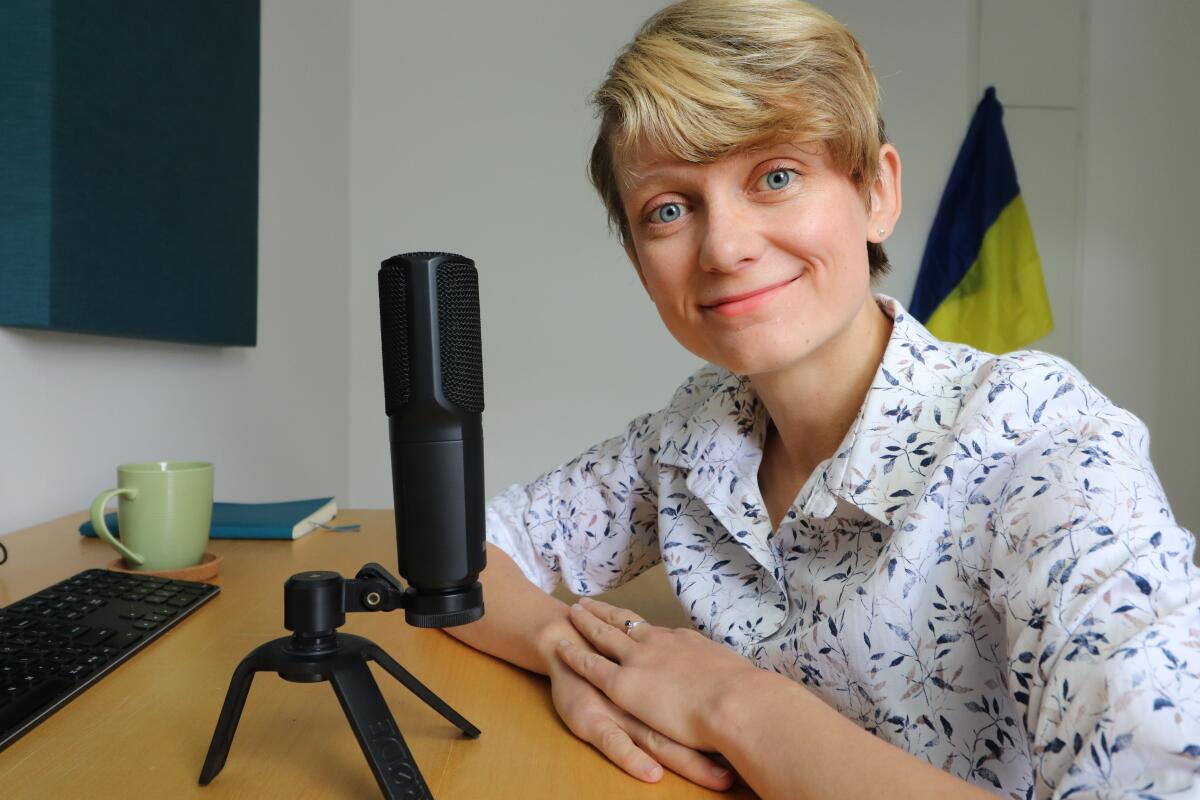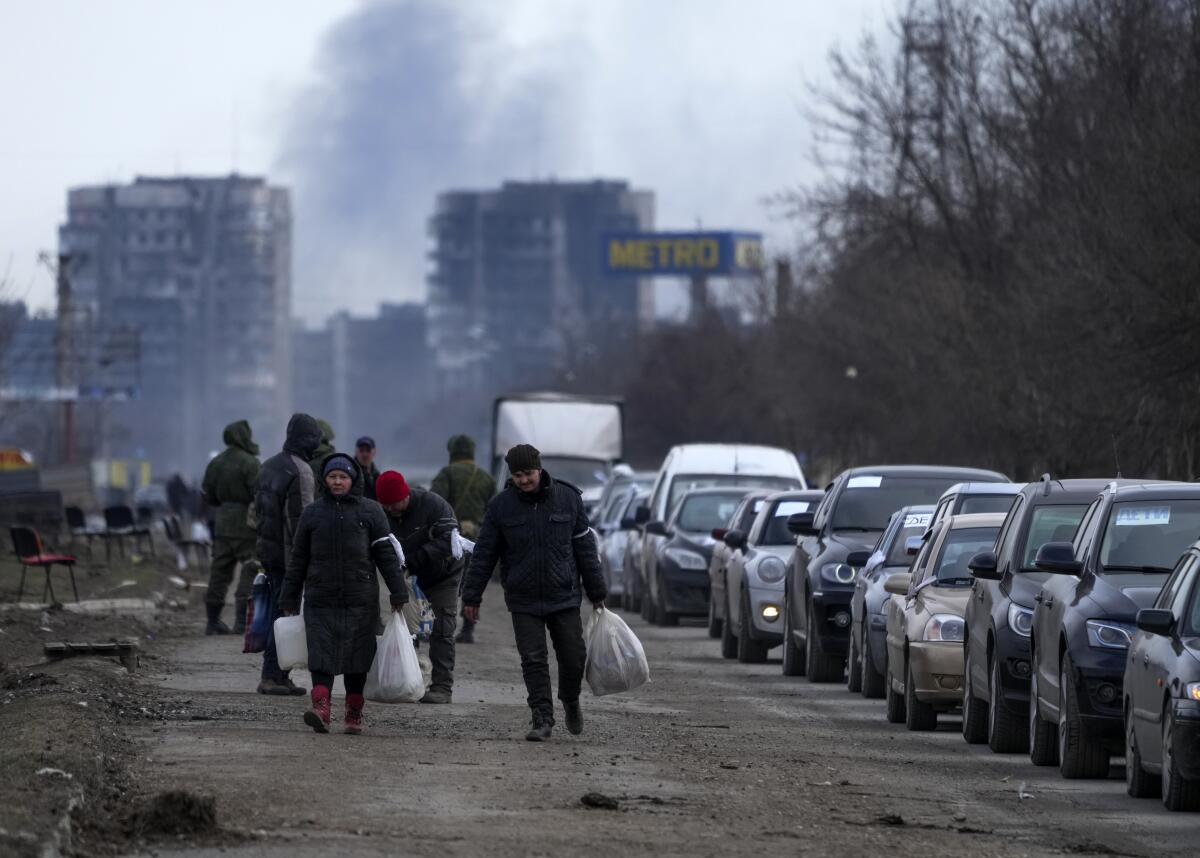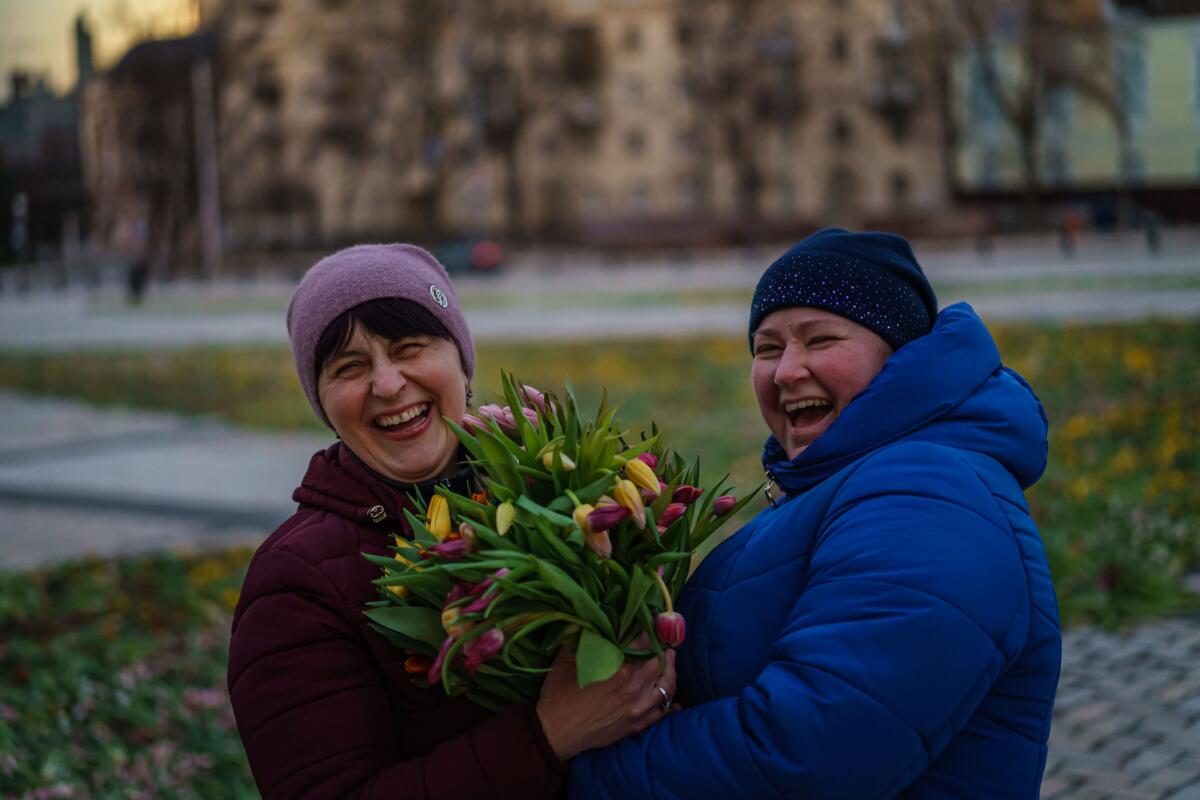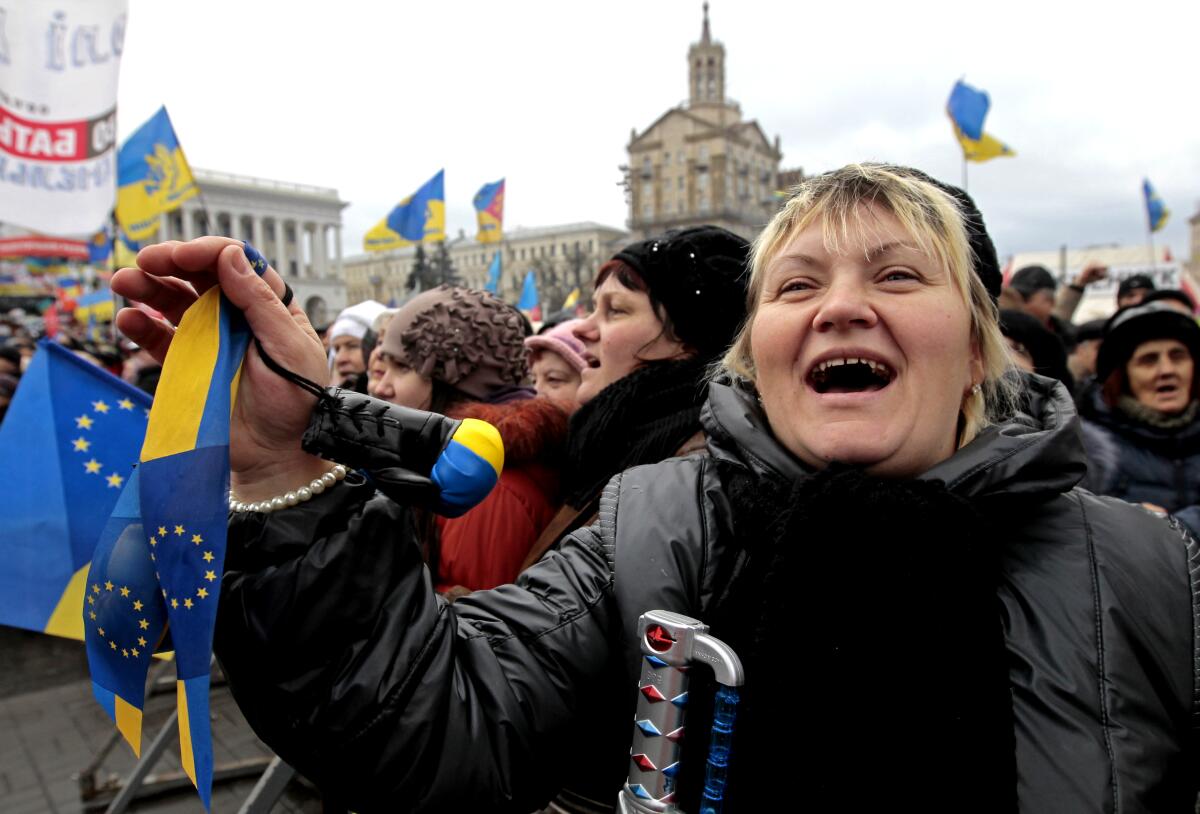For centuries, the Ukrainian language was overshadowed by its Russian cousin. That’s changing

Languages rise and fall with history, in nations and university language departments alike. In 1980, when Roman Koropeckyj stepped into his classroom at Harvard to teach Polish, he was “gobsmacked” by the dozens of students awaiting him. The Polish trade unionists of the Solidarity movement, who were defying Soviet oppression on the opposite side of the planet, had inspired Americans to learn.
Another one of those linguistic flashpoints arrived in February, when Ukraine’s staunch resistance to a massive Russian invasion drew admirers around the world. The Ukrainian language hasn’t been taught at UCLA’s department of Slavic East European and Eurasian Languages and Cultures “in a number of years” due a lack of demand, said Koropeckyj, a professor in the department. He and a Ukrainian-born colleague told the department chair it might be time to teach Ukrainian again.
“There are moments in recent history where you see this massive uptick in learning language because language is in the news,” Koropeckyj said, predicting heightened interest in Ukrainian “for the foreseeable future.” Not only that, the unpopularity of the invasion “might change the way people go to study Slavic languages, and Russian may have lost the cachet that it’s had up until now for decades.”
In the month since Russian President Vladimir Putin’s troops surged across Ukraine’s frontiers, the Ukrainian language — long overshadowed by its world-famous Russian cousin, which is also widely spoken in Ukraine — has stepped into the global spotlight as a symbol of defiance, national identity and survival. More bilingual Ukrainians are switching languages as a rebuke to Russian meddling, and many outsiders who once saw Ukrainian as a linguistic afterthought to Russian are now picking up Ukrainian instead.
When Breena Branham was a music teacher in Utica, N.Y., many of her young students were from Ukraine, Belarus and Russia, which were once all part of the Soviet Union, where Russian was the language of power. “I feel bad now, because I did not ever ask them where their families were from, and I never learned the differences,” said Branham, a retiree in Suffolk, Va. “When this [invasion] happened in Ukraine, I thought, I’m gonna go ahead and start learning Ukrainian on Duolingo.”
Between late February and March 20, the number of users taking Ukrainian language courses on the popular language app Duolingo increased by 577%, according to the company, with Ukrainian moving from the 33rd most-popular language to 13th most-popular on the app.
“Language learning reflects all kinds of patterns in pop culture,” said Cindy Blanco, a senior learning scientist at Duolingo, citing a rise in Portuguese learners during the 2016 Olympics in Brazil and a rise in Korean learners after the Netflix show “Squid Game” became an international sensation.
Instead of classroom learning or one-on-one tutoring, Duolingo uses a gamified form of teaching in which users are shown words with pictures and asked to translate sentences, an accessible method that has made the app widely popular.
The growth of digital language services such as Duolingo in recent decades has also made it easier to pick up a foreign language on a moment’s notice for family, social or even political reasons. Since Putin has given lengthy speeches about the supposed historical unity of the Russian and Ukrainian peoples, that can make picking up some Ukrainian a more easily achievable symbolic act.
“My understanding is that Russia doesn’t consider Ukraine an independent country, doesn’t see the culture as something distinct, and doesn’t see the language as something distinct,” said Simone Theiss, a lawyer in London who began learning Ukrainian on Duolingo after the February invasion. Learning the language is one way “to say I consider the language distinct.”

Some of the surge in interest is clearly related to how many Ukrainians have fled the country in the largest European refugee crisis since World War II. In Poland, which sits on Ukraine’s western border, the number of Duolingo users studying Ukrainian has increased by 2,677%, according to the company, which said it was donating its related ad revenues to refugee relief efforts.
The Romania-based language-learning company Mondly, which has seen a 900% increase in users trying to learn Ukrainian on its services, has also seen a corresponding “huge increase” in the number of Ukrainian-speaking users trying to learn other languages, a spokesperson said in an email. The company is offering free premium services to Ukrainian users.
Inside Ukraine, the role of the Ukrainian language is complex and still changing, much like the young nation itself. For centuries, the region was dominated by neighboring powers, some of whose leaders — from tsars to Stalin — tried to suppress the Ukrainian language in favor of Russian, which possesses a formidable political, artistic and literary legacy.
When Ukraine’s citizens voted to break away from the Soviet Union in 1991 to form an independent nation, Ukrainian was deemed to be the official national language. In the minds of many Westerners, however, the two countries and the two languages still blurred together.
“When I was growing up [in the U.S.], it was common when you said you’re Ukrainian for people to say, ‘oh, is that like Russian?’” said Laada Bilaniuk, professor of anthropology at the University of Washington, whose parents were Ukrainian. “Obviously Russian is a world language and Ukrainian has connotations of being a peasant language.”

Even in Ukraine, being Ukrainian does not necessarily mean speaking Ukrainian. A 2001 census said roughly a third of Ukrainians identified Russian as their “native” language in the nation of more than 40 million, and Russian has played a central role in everyday life and culture for many Ukrainians. The current president, Volodymyr Zelensky, uses Ukrainian but is a native Russian speaker. Recent visitors were often struck by Ukrainian TV shows where an interviewer might ask a question in Ukrainian and receive an answer in Russian. (The languages are both in the East Slavic language group but are distinct; it’s like asking a question in Spanish and getting an answer in Italian.)
As recently as 2012, parliament had passed a measure formally boosting status and protections for Russian. In a visit by Putin a year later, the Russian president, trying to draw Ukraine away from the European Union and celebrating the countries’ shared histories, pronounced in Kyiv that “we are, without a doubt, one people.”
But in language and in politics, Ukrainization and Europeanization soon took an upper hand. In 2014, Anna Ohoiko was one of many Ukrainian college students who joined the Maidan protests against pro-Russian President Viktor Yanukovich, who tried to block closer ties with the European Union and was eventually removed from office. While brewing tea on Kyiv’s main square to keep the frigid temperatures away, Ohoiko started wondering what she could do for her country’s future.
“I was mostly thinking about the image of Ukraine in the world, and the fact that so many people confuse Ukraine with Russia,” Ohoiko said. She decided that “in order for the world to take Ukraine seriously as an independent country, with its own potential, we need to change this perspective of how the world perceives us. People need to have opportunity to learn Ukrainian language with better resources, and that’s what I wanted to provide.”

First she created a small Facebook page for how to learn Ukrainian. Then she started a website, UkrainianLessons.com. Then she created two podcast series, Ukrainian Lessons Podcast and Five Minute Ukrainian, which each have scores of episodes directed toward English speakers. The episodes are focused on language, not politics.
“The Ukrainian language is not the hardest one, and not the easiest,” Ohoiko says in the first episode of Ukrainian Lessons Podcast. “You might be scared of the weird alphabet or some of the cases of a single noun. But believe me, I was also scared by the multiple past tenses of English” and learned it anyway. “I hope this podcast will be something to keep you excited and eager to learn Ukrainian.”
In recent times, some Ukrainians have also been offering classes for the country’s monolingual Russian speakers to pick up Ukrainian, with foreigners featured in advertisements to show off the language’s international value — a symbol of an increasingly self-confident, independent country with an evolving but clearer identity.
“We are witnessing right now, really, the birth of a modern nation,” said Volodymyr Dibrova, a Ukrainian writer and a preceptor who teaches Ukrainian at Harvard University, who said the language was entering an “Elizabethan period” of rejuvenation and improvisation: the more widely it’s embraced, the more lived-in and rich the language becomes.
“Before the breakup of the Soviet Union, the Ukrainian language was more like a museum item. It’s on the wall: ‘Look, it’s a sword, what a beautiful sword,’” Dibrova said. “But now it’s a tool, it’s an active tool, it’s taken off from the wall, it’s used actively, sometimes appropriately, sometimes not, there’s dirt on it. But we’re in business now.”
When Steve Kaufmann, the co-founder of the digital learning service LingQ, visited Ukraine in the 2010s, he realized he needed to know Ukrainian and not just Russian to understand the country. “There’s a tendency to treat Ukrainian or Ukraine as a sort of junior Russia, which it isn’t,” Kaufmann said. “It has a language of its own, a culture of its own, with a language well worth learning.”
In recent years, politicians have also sometimes pushed laws more widely mandating the use of Ukrainian, inflaming fears about the rights of speakers of minority languages including Russian. One controversial law passed in 2019 mandated that news publishers printing stories in non-Ukrainian languages also publish Ukrainian versions.
In neighboring Russia, Putin has seen the cultivation of a separate national identity, including new policies emphasizing the use of Ukrainian over Russian, as part of a Western plot to undermine Russian security and akin to Russophobic ethnic cleansing by so-called “Nazis.” In 2014, Russian-backed forces seized Crimea and the eastern Ukrainian regions of Donetsk and Luhansk, where Putin claimed Russian-speaking residents “took up arms to defend their home, their language and their lives.”
During the Maidan protests, “all the things that united us and bring us together so far came under attack. First and foremost, the Russian language,” Putin wrote in a 2021 essay titled “On the Historical Unity of Russians and Ukrainians.” “It would not be an exaggeration to say that the path of forced assimilation, the formation of an ethnically pure Ukrainian state, aggressive towards Russia, is comparable in its consequences to the use of weapons of mass destruction against us.”
Russia’s 2014 interventions expanded to a full-scale invasion and bombardment in February, which in many ways has exposed the vast chasm between Russia’s nationalist rhetoric and Ukraine’s reality. Much of Russia’s worst brutality has landed on Eastern and Southern cities where Ukrainians predominantly speak Russian. Many of the videos of Ukrainian soldiers fighting on the front lines show them giving commands and celebrating in Russian.
And by all accounts, the attack has only tightened the Ukrainian language’s symbolic grip.
“It was clear, right before the outbreak of the invasion, and during the invasion and up until now, when one hears interviews on the radio, more and more people are interviewing in Ukrainian than previously,” said Koropeckyj, the UCLA professor. “There are several videos I’m seeing on Twitter or TikTok or whatever of these guys having just destroyed several Russian tanks, and in one a guy turns to the other and says, ‘After this, I’m never going to speak Russian again.’”
Iryna Shchur, a language tutor in Kyiv who teaches both Ukrainian and Russian, said that since the February invasion, many of her students, in addition to some Ukrainians, have switched from Russian to Ukrainian.
But she also emphasized that, unlike for Putin, for Ukrainians “language is not the issue, it has never been the issue, we speak both languages,” Shchur said. “One of the key concepts of the nation is our language. But again: People speak in Russian, people text in Russian. It’s difficult to change everything.”
Multiple interviewees for this story said they had heard about young Ukrainian parents switching their primary languages from Russian to Ukrainian so that their children will grow up as native Ukrainian speakers. “In a way, Putin’s invasion made it matter more, and people have felt compelled to say ‘Huh, why aren’t I speaking Ukrainian?’” Bilaniuk said.
As for Ohoiko’s podcast, downloads have surged three to four times their level since the February invasion, said Ohoiko, who now lives in Sweden. She hopes the interest lasts.
“When Ukraine wins [the war] finally — and it’s already winning — then Ukraine will become quite a different country, and become a very different country in the scale of the world, maybe one of the greatest countries in our time,” with many opportunities for foreigners, Ohoiko said.
She added: “This is another reason to already start learning Ukrainian.”
More to Read
The biggest entertainment stories
Get our big stories about Hollywood, film, television, music, arts, culture and more right in your inbox as soon as they publish.
You may occasionally receive promotional content from the Los Angeles Times.











